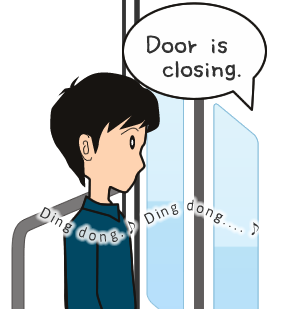- HOME
- Ono Sokki's Patio
- Sound Signal of Stations

Sound Signal of Stations
Dad: Have you noticed "ding-dongs" or a chirping of bird near a ticket gates or stairs at a station?
Ken: Yes. I've heard these sounds but I don't know what they are.
Dad: They are sound signals telling where the ticket gates and stairs are for the visually impaired.
Ken: Signal?
Dad: Yes. Other than voices that directly relay the meaning, if people know "this sound means this", such sounds could be used to relay the message as well. The ding-dongs at the station means "here is the ticket gates", and bird chirping means "here is the stairs for the platform" for the visually impaired.
Ken: I see. What other sound signal are there? What about the sound that rings right before the train leaves?
Dad: Yes. It's not indicating a location, but a sound for
timing so it's a sound signal for everyone. It's called a
"boarding promotion sound" but basically the intention is to
finish boarding before the chime ends.
Ken: But often there are people running to board at the last minute and after the chime the conductor makes an announcement "Closing doors. Please do not run onto train".
Dad: Yes. Railway companies are now thinking that the chime might be, on the contrary, promoting people to run onto the train at the last minute, and are experimenting many conditions; reducing the duration, eliminating the chime, etc. They've got no conclusion yet. People's mentality of taking action promoted by a sound is profound and there is not a single answer for it.
Ken: That's interesting. At stations, other than sound signals, they play recorded sounds repetitively.
Dad: There are sounds that notify the up or down of an escalator, and men or women restroom at the stations.
Ken: They directly indicate locations, so they are for the visually impaired.
Dad: Yes. As you said, depending on stations, these recorded sounds are played unceasingly. At some stations, the escalator guidance sound overlaps with multiple guidance sound, so it must be hard to hear.
Ken: And the echoing is long, so sometimes you can't hear what they are saying.
Dad: Some places within station are semi-outdoors, and it is difficult to use sound absorbing material in the station, so generally many places have long echoes. Acoustic designs are done in recent public spaces but this wasn't considered with the older buildings.
Ken: And they didn't have sound signals before, right?
Dad: You are right. As the "sound signal" spreads, many different problems are rising. There are people who think "sound signals" are bothersome noise. To tell you the truth, I am rather bothered by them. I believe there are many things to be improved for visually impaired people, including the structure of building and how to present the sound signals.
Ken: It doesn't bother me much. There are exclusive chimes at local stations, so my train fanatic friends collect these sounds.
Dad: I see. In the end, what determines if these sounds are unwanted or not, is not things like the volume but the individual's preference. Compared to Western countries, Japan is inundated with sounds from speakers, and some researchers raise concerns about such city soundscape. Keeping a balance between unwanted noise and safety/convenience is difficult, just like we talked before about the hybrid or electric cars and their warning alarm.
Ken: With sound problems, balance needs to be made with other demands.
Dad: Yes. Sound is always around and you don't realize it or is taken for granted, but plays several roles in our lives. Sounds that provide safety and convenience, and also aren't unwanted by people need to be thought of, along with the space that provides the sound.
- © ONO SOKKI CO., LTD. 1996-2026
